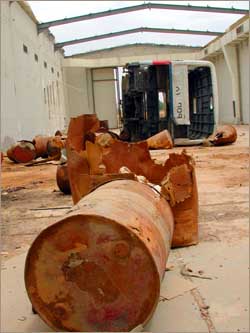 |
 |  |
|||||||
 |
Home | The Sunni Heartland | The Unexpected War | Paying the Price |
|||||||
|
The Unexpected War Insurgency The fall of Saddam Hussein's regime liberated Iraq's Islamic extremists. These homegrown militants began to preach fiery Friday sermons against the American occupation while encouraging others to organized an armed holy war. International recruits could read any number of Web sites calling for volunteers to head to Iraq. The country's long borders, unpatrolled since the end of the war, became an open door for radical Muslims; Iraq is the new battleground for their violent grudge against the United States. Hussein Haqqani, a resident scholar at the Carnegie Endowment for International Peace has been monitoring the Internet messages of Islam's extreme holy warriors. He says, "There certainly are the extremists who want to go where the big game is. They have done it in the past... And for this moment they think Iraq is it.
Islamic extremists were the first suspects in the August 19, 2003 bombing of the United Nations headquarters in Baghdad. A suicide bomber drove a truck in the U.N. compound and set off a massive explosion at just at 4 in the afternoon. But the truck was packed with sophisticated military explosives from the Iraqi Army arsenal. Was this al Qaeda? Disgruntled former military men? No one could say for sure. The explosion collapsed a corner of the concrete and glass hotel that had been the U.N. headquarters in Baghdad for more than a decade. The U.N.'s chief diplomat in Iraq died in the blast, as well as 24 others. The U.N. attack followed destructive hits on major water and oil pipelines, and on the Jordanian embassy. By late August, the pressure to add more troops in Iraq was rising. "It's not a question would they send more troops if they had them," says James Dobbins, Policy Director at the Center for International Security and Defense Policy for the Rand Corporation. "I mean we simply don't have more troops. One third of the U.S. Army is in Iraq, which means every single man and woman in the U.S. Army is either in Iraq, or is on his or her way to Iraq, or coming back from Iraq. Given our other commitments worldwide, the need to maintain a reserve, we're fully stretched. And the only way we can raise the troops numbers in Iraq is bringing in foreign troops in a much more significant way than we have been able to do so far." With the U.S. deploying 90 percent of the troops, paying 90 percent of the costs of occupation, and suffering 90 percent of the casualties, the price of going it alone was becoming clear. The Pentagon had plans to reduce troops strength from 150,000 to 30,000 after the war, but those plans were quickly abandoned as the Iraq insurgency gained momentum. Bad news for these young men and women on a hot, dusty piece of ground on the outskirts of Falluja. The 3rd Infantry Division had brought the war to Baghdad. In early June 2003, home base was a city that had become one center of the armed rebellion. When would the 3rd Infantry Division be going home? Nobody knew. "Once you found out there's no actual date you're going home, you can't count down anything, there, you don't look forward to the next day," explained one soldier. "Nobody really cares about anything, you know," says Private First Class James Hargeht, commenting on the heavy toll of the uncertainty. "Good news you don't believe it 'cause it don't happen. They say good news and something changes. That's all it is." It was a typical reaction, and there were more serious ones. Some soldiers simply withdrew into silence, others couldn't eat or sleep. Then there were the nightmares. Soldiers saw their friends die in Falluja. They had been shot at themselves. |
||||||||
